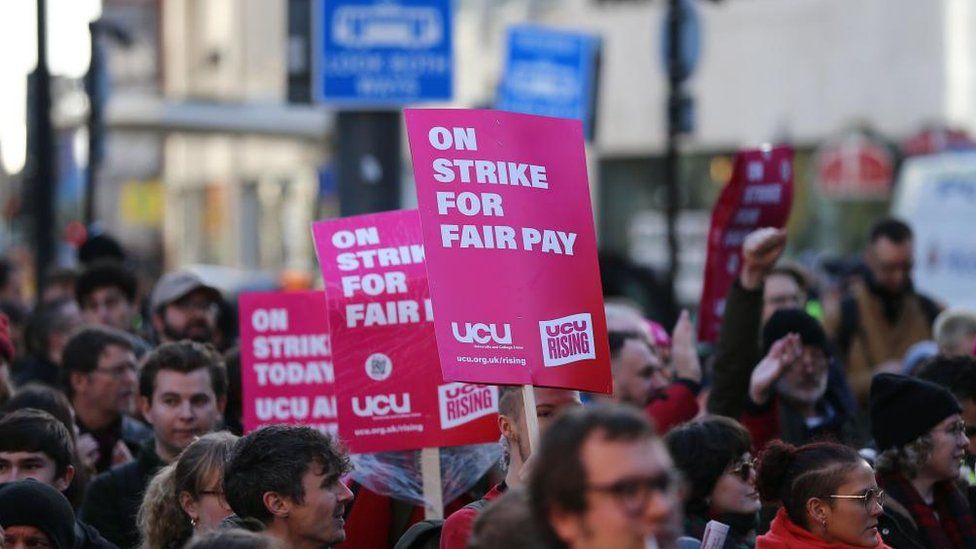UK universities face unprecedented challenges as they grapple with the impact of job cuts amidst financial strains and declining foreign student enrollments. Reports reveal that hundreds of university staff are at risk of redundancy, with institutions implementing various cost-saving measures to address deficits. As the higher education landscape undergoes significant shifts, the implications of these job cuts reverberate across campuses, prompting concerns about the future of academic and support services.
If you’re thinking about studying in the UK, it’s crucial to find the right student accommodation. That’s where uhomes.com comes in. It’s a reliable platform that helps students like you find the perfect place to live in London, Manchester, Nottingham, Newcastle, Leeds and many other cities.

Recent Updates on Job Cuts in UK Universities
Recent updates on job cuts in UK universities highlight the significant challenges facing higher education institutions amidst a decline in foreign student enrollments. Reports from Independent and The Times indicate that hundreds of university staff are at risk of losing their jobs as universities grapple with financial deficits. At least 15 universities have announced redundancies and cost-saving measures in response to these challenges.
In early March, Sheffield Hallam University issued ‘redundancy risk’ letters to over 120 staff members, urging them to consider voluntary redundancies or apply for a limited number of available positions. Similarly, the University of Kent proposed cutting 58 posts and nine programs to address financial pressures.
The decline in foreign student enrollments is a significant factor contributing to the financial strain on UK universities. This decline has raised alarm among university leaders, with some expressing concerns about the possibility of insolvency for certain institutions. As universities navigate these challenges, they are faced with making difficult decisions to secure their financial stability and avoid potential financial crises.
Why are There Job Cuts at UK Universities?
The job cuts at UK universities in 2024 stem from a complex set of financial challenges plaguing higher education institutions nationwide. A neglected funding system, acknowledged as inadequate for meeting the needs of students, organizations, and the public, has left universities grappling with unprecedented financial strain. Factors such as the tuition-fee freeze, coupled with escalating costs, have exacerbated the situation, resulting in significant pressure on university budgets.
Declining student enrollments have further exacerbated the financial crisis, prompting institutions to implement cost-saving measures. For example, Goldsmiths attributed its planned cuts to lower-than-expected student recruitment, alongside the long-term decline of certain subjects and a decrease in student metrics. In essence, universities are undergoing restructuring efforts to navigate the challenging economic landscape they currently face.
What are the Effects of Job Cuts at UK Universities?
Job cuts at UK universities can have profound implications for both faculty and students. With a reduction in staff positions, departments may struggle to uphold the same standards of teaching quality and research productivity. Moreover, these cuts often breed a sense of uncertainty among remaining staff, affecting morale and overall productivity.
The impact of these job losses, as seen at Goldsmiths, University of London, extends beyond mere numbers. Given that many staff members are on part-time contracts, the effect of 130 job cuts is likely to ripple across various departments, including theatre and performance, history, English and creative writing, and more. This concentration of redundancies across multiple disciplines risks depleting valuable expertise and institutional knowledge, further destabilizing university operations.
For students, fewer faculty members may translate to reduced access to academic support and guidance. Cuts in support services like counseling or career guidance can adversely affect student well-being and academic success. Additionally, diminished support for international students could compromise the quality of education and assistance available to this important demographic.
Actions in Response to Job Cuts at UK Universities
University of Aberdeen
Staff at the University of Aberdeen had announced plans to strike for six days in March in response to the university’s proposed job cuts within the modern languages department. The University and College Union (UCU) reported that their members had voted overwhelmingly in favor of strike action, with an 80% ballot approval and a 60% turnout. The strike was scheduled to commence on Tuesday, March 12, with intentions to escalate throughout the month, according to the union. Notably, a petition advocating for the preservation of modern languages at the university garnered support from over 17,000 individuals, while MSPs from various political parties expressed opposition to the proposed cuts. Additionally, UCU members intended to participate in alternative measures, such as working to contract and refraining from rescheduling classes affected by the strike. However, the planned strike at the University of Aberdeen for March was called off following the university’s decision to withdraw the threat of compulsory redundancies affecting 26 staff members.
University of Winchester
On March 14, UCU revealed the possibility of strike action at the University of Winchester following a vote among its members to explore industrial action. This decision was made during a well-attended meeting held last Friday. The proposed changes put staff at risk of redundancy and entail the closure of key programs and departments, including the English language program, Institute for Climate and Social Justice, Center for Religion, Reconciliation, and Peace, and managed housing. Additionally, cuts are planned for psychology, acting, and apprenticeships. The university attributes these measures to a £6 million structural deficit, with 40 jobs slated for elimination in the initial phase and concerns about further cuts looming. UCU emphasized that staff and students should not bear the consequences of the leadership’s financial mismanagement. As a response, the union intends to file a formal dispute with the university, with the possibility of initiating a strike ballot later this month.


Goldsmiths, University of London
In February 2024, a strike ballot was initiated regarding Goldsmiths, University of London‘s proposal to cut 130 jobs as part of its ‘transformation programme’. The ballot will remain open until Thursday, March 28th.
Are Job Cuts at UK Universities Common?
Yes, job cuts at UK universities have become increasingly common in recent years due to a combination of factors. These include financial challenges stemming from reductions in government funding, uncertainties surrounding Brexit, changes in student enrollment patterns, and the impact of the COVID-19 pandemic on university finances.
Additionally, some universities have faced pressure to adapt their staffing levels and course offerings in response to shifts in demand for certain subjects and changes in the higher education landscape. As a result, job cuts have been implemented as a cost-saving measure by many institutions, leading to concerns about the potential impact on staff morale, academic quality, and student experience.
Are Strikes Frequent at UK Universities?
Strikes at UK universities, particularly within the higher education sector, are a recurring occurrence. These strikes often stem from disputes between university staff and management, revolving around issues like pay, pensions, working conditions, and job security. Staff members, including academics, administrative personnel, and support workers, may organize strikes to voice their grievances or negotiate for better terms. Unfortunately, these strikes can disrupt normal university operations, impacting teaching, research, and administrative activities, and causing frustration among students.
In recent years, strikes by UK university staff have become increasingly common, with pay being a primary point of contention. Inflation rates in the UK have surged due to various factors, including the COVID-19 pandemic and geopolitical tensions, reaching as high as 9 percent in 2022 – the highest in nearly four decades. Consequently, the livelihoods of ordinary academic staff have been significantly affected by these economic pressures.


In early 2023, a significant wave of strike action swept through 150 UK universities during February and March. The strikes aimed to compel university employers to substantially enhance their offers amidst disputes over pay, working conditions, and pension reductions. Tens of thousands of members from the University and College Union (UCU) participated in these strikes, impacting approximately 2.5 million students across the nation.
FAQ
What does UCU stand for in the UK?
UCU stands for the University and College Union in the UK. It is a trade union representing academic and professional staff working in higher education institutions and further education colleges.
What's the function of UCU in the UK?
The function of UCU in the UK is to represent the interests of university and college staff, including academics, researchers, and support staff, by negotiating their pay, conditions, and pensions, as well as advocating for their rights and working conditions.
Can students join UCU?
No, students cannot join UCU. UCU is specifically for university and college staff. However, students may support UCU’s initiatives and campaigns.








